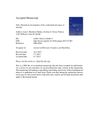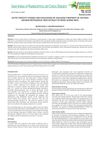 40 citations,
August 2014 in “Journal of Nanoparticle Research”
40 citations,
August 2014 in “Journal of Nanoparticle Research” Silver nanoparticles in gel form can effectively heal wounds.
 34 citations,
July 2011 in “Journal of Dermatological Treatment”
34 citations,
July 2011 in “Journal of Dermatological Treatment” Curcuma aeruginosa extract combined with minoxidil effectively treats male-pattern baldness.
 26 citations,
April 2019 in “Journal of Cosmetic Dermatology”
26 citations,
April 2019 in “Journal of Cosmetic Dermatology” Herbal alternatives like saw palmetto and green tea may offer safe, effective treatment for hormonal hair loss.
 22 citations,
August 2011 in “Journal of Supercritical Fluids”
22 citations,
August 2011 in “Journal of Supercritical Fluids” Rice bran extract might help prevent hair loss.
 14 citations,
April 2018 in “ACS Biomaterials Science & Engineering”
14 citations,
April 2018 in “ACS Biomaterials Science & Engineering” Nanoemulsion is a promising method for delivering luteolin to promote hair growth without minoxidil's side effects.
 14 citations,
January 2017 in “Elsevier eBooks”
14 citations,
January 2017 in “Elsevier eBooks” CBG may help with various medical conditions but needs more human research to confirm safety and effectiveness.
 14 citations,
December 2013 in “Molecules”
14 citations,
December 2013 in “Molecules” Two compounds from Asiasarum heterotropoides roots show potential as lung cancer treatments without harming normal cells.
 8 citations,
January 2016 in “Evidence-based Complementary and Alternative Medicine”
8 citations,
January 2016 in “Evidence-based Complementary and Alternative Medicine” Rumex japonicus extract may promote hair growth more effectively than Minoxidil.
 7 citations,
January 2015 in “Evidence-based Complementary and Alternative Medicine”
7 citations,
January 2015 in “Evidence-based Complementary and Alternative Medicine” The review suggests renaming two herbs to avoid confusion and recommends more research for safe use.
 3 citations,
July 2017 in “Journal of Molecular Graphics & Modelling”
3 citations,
July 2017 in “Journal of Molecular Graphics & Modelling” The study found that baicalin has different stable shapes in gas and water, with two shapes better for interacting with positive charges in water.
 3 citations,
January 2016 in “Elsevier eBooks”
3 citations,
January 2016 in “Elsevier eBooks” Steroid hormones are crucial for body functions and have various medical uses, but their misuse can lead to dependence.
 2 citations,
July 2019 in “Journal of psychology & clinical psychiatry”
2 citations,
July 2019 in “Journal of psychology & clinical psychiatry” Zinc helps reduce the severity of depression.
 1 citations,
April 2024 in “International Research Journal of Modernization in Engineering Technology and Science”
1 citations,
April 2024 in “International Research Journal of Modernization in Engineering Technology and Science” Herbal shampoo cleans hair well and is safer than regular shampoos.
 1 citations,
July 2023 in “Horticulture research”
1 citations,
July 2023 in “Horticulture research” Tiny RNA molecules help control the growth of plant hairs.
 1 citations,
February 2022 in “International Journal of Health and Pharmaceutical (IJHP)”
1 citations,
February 2022 in “International Journal of Health and Pharmaceutical (IJHP)” Combining cantigi and henna leaf extracts boosts antioxidant activity.
 1 citations,
April 2021 in “Plant Archives/Plant archives”
1 citations,
April 2021 in “Plant Archives/Plant archives” Onions may help reduce cancer risk and obesity-related issues.
 1 citations,
October 2015 in “CRC Press eBooks”
1 citations,
October 2015 in “CRC Press eBooks” Nutricosmetics with active ingredients can help with hair loss and improve hair growth.
 1 citations,
July 2007 in “Regenerative Medicine”
1 citations,
July 2007 in “Regenerative Medicine” Stem cell research and regenerative medicine have made significant advancements in treating various diseases and conditions.
 June 2024 in “International Journal For Multidisciplinary Research”
June 2024 in “International Journal For Multidisciplinary Research” Herbal powder shampoo is effective, safe, and beneficial for various hair needs.
 April 2024 in “The journal of phytopharmacology”
April 2024 in “The journal of phytopharmacology” Orchid callus extract can help hair grow and may be used in eco-friendly hair products.
 January 2024 in “International Research Journal Of Modernization In Engineering Technology And Science”
January 2024 in “International Research Journal Of Modernization In Engineering Technology And Science” Licorice helps with acne, eczema, dandruff, hair growth, and skin health but may raise blood pressure.
 January 2024 in “Brazilian Journal of Hair Health”
January 2024 in “Brazilian Journal of Hair Health” Modern hair care trends often reinvent old practices to create new trends or reinforce existing ones.
 January 2024 in “Tropical journal of pharmaceutical research”
January 2024 in “Tropical journal of pharmaceutical research” Cirsium japonicum var. spinossimum seeds may help reduce inflammation and fight cancer.
 November 2023 in “International Journal For Multidisciplinary Research”
November 2023 in “International Journal For Multidisciplinary Research” Herbal hair oil made with natural ingredients helps reduce hair loss, dandruff, and graying.
 August 2023 in “Malaysian Journal of Medicine and Health Sciences/Malaysian journal of medicine and health sciences”
August 2023 in “Malaysian Journal of Medicine and Health Sciences/Malaysian journal of medicine and health sciences” Pueraria mirifica extract may help treat benign prostatic hyperplasia.
 July 2023 in “International journal of current research in chemistry and pharmaceutical sciences”
July 2023 in “International journal of current research in chemistry and pharmaceutical sciences” The shampoo made with Bhringraj leaf and other natural ingredients shows promise as a natural dandruff solution.
 December 2022 in “International Research Journal Of Modernization In Engineering Technology And Science”
December 2022 in “International Research Journal Of Modernization In Engineering Technology And Science” Cosmeceuticals are special products that improve skin and hair health and have benefits like treating acne and wrinkles, protecting from the sun, and helping with dandruff and hair growth.
 September 2022 in “Research Square (Research Square)”
September 2022 in “Research Square (Research Square)” Caffeic acid helps protect rats from the harmful effects of acrylamide.
 September 2019 in “Asian Journal of Pharmaceutical and Clinical Research”
September 2019 in “Asian Journal of Pharmaceutical and Clinical Research” Teak seed extract is safe and reduces pain in mice.
 December 2011 in “Asia-Pacific biotech news”
December 2011 in “Asia-Pacific biotech news” In 2011, there were major scientific breakthroughs in cancer treatment, immunity, Parkinson's, virus simulation, schizophrenia, hair growth, lung cancer, and medical grafts.






























